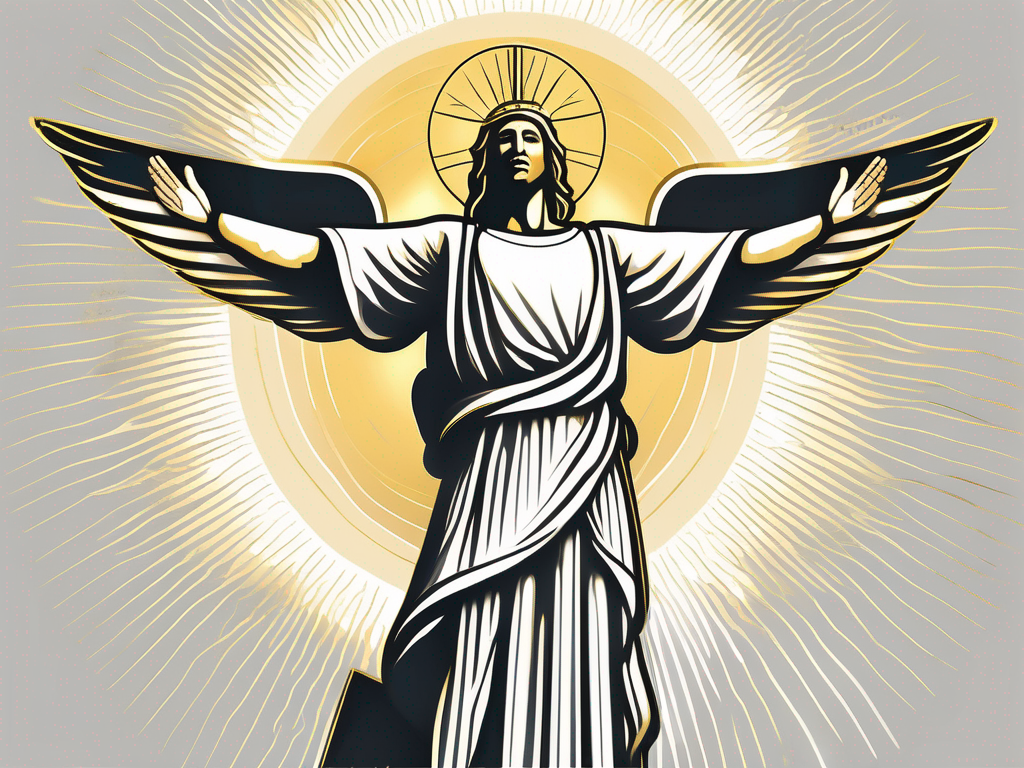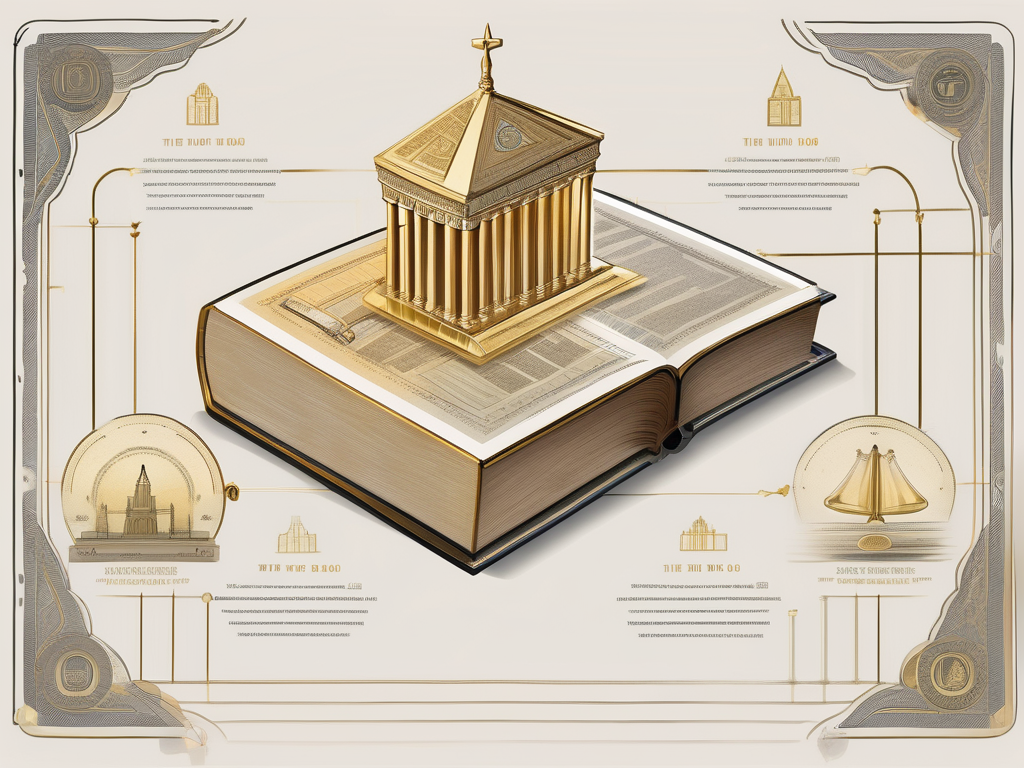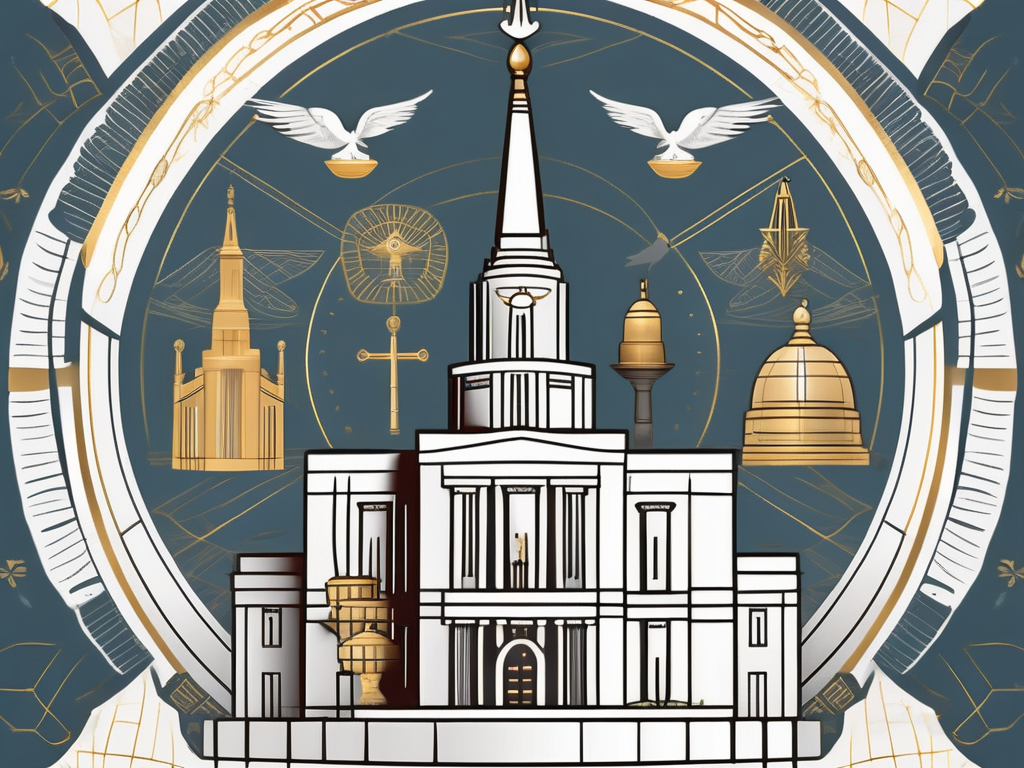Joseph Smith, the founder of the Church of Latter-Day Saints, left behind a rich legacy of teachings that continue to shape the beliefs and practices of Mormons today. In this article, we will explore the fascinating life of Joseph Smith, his key teachings, and the role of prophets in Mormonism. We will also delve into some of the unique practices and rituals that are central to the Mormon faith.
The Life and Legacy of Joseph Smith
Joseph Smith’s life was marked by moments of great triumph and deep sorrow. Born in Vermont in 1805, he experienced a spiritual awakening at a young age. This led to his conversion to Christianity and the eventual founding of the Church of Latter-Day Saints in 1830.
Despite the initial excitement and growth of the new church, Joseph Smith and his followers faced intense persecution from those who disagreed with their beliefs. This persecution ultimately culminated in Smith’s martyrdom in 1844.
Early Life and Conversion
Joseph Smith’s upbringing was steeped in religious fervor. His family belonged to the Protestant tradition and regularly attended church services. One day, while reading the Bible, Smith stumbled upon a verse that struck a chord within him. This experience ignited his quest for spiritual truth and eventually led to his conversion to Christianity.
As a young man, Smith became renowned for his visionary experiences and claims of divine communication, which set him on a path to establish a new religious movement.
Smith’s spiritual journey was not without its challenges. He faced skepticism and criticism from those who doubted the authenticity of his experiences. However, his unwavering faith and determination propelled him forward.
Founding the Church of Latter-Day Saints
In 1830, Joseph Smith officially organized the Church of Latter-Day Saints. He claimed to have received revelations from God, which were recorded as the Book of Mormon. This sacred text, alongside the Bible, became the foundation of the Mormon faith.
The teachings of the Church of Latter-Day Saints were centered around the belief in the restoration of the true church and the idea of continuing revelation from God. Smith’s charismatic leadership and ability to inspire others played a crucial role in the rapid growth of the movement.
Smith’s vision for the church extended beyond religious doctrine. He emphasized the importance of community, encouraging his followers to live harmoniously and support one another. This sense of unity and shared purpose fostered a strong sense of belonging among the members of the church.
Persecution and Martyrdom
The rapid growth of the Mormon movement generated hostility from various quarters, leading to persecution and violence against Smith and his followers. Smith and his brother Hyrum were eventually arrested and imprisoned in 1844. Tragically, they were both killed by a mob while awaiting trial.
The news of Smith’s martyrdom sent shockwaves through the Mormon community. His death was seen as a testament to his unwavering commitment to his beliefs and the sacrifices he made for the sake of the church.
Smith’s martyrdom solidified his place as a revered figure within Mormonism, and his teachings continued to guide and inspire generations of believers. His legacy lives on in the Church of Latter-Day Saints, which has grown into a global religious movement with millions of members worldwide.
Today, Joseph Smith is remembered not only as the founder of a religious faith but also as a visionary leader who faced adversity with courage and unwavering conviction. His life serves as a reminder of the power of faith and the enduring impact one person can have on the world.
Key Teachings of Joseph Smith
At the core of Joseph Smith’s teachings is the belief in the divine nature of the Book of Mormon. According to Smith, the book contains the words of ancient prophets who lived on the American continent and provides an additional testament of Jesus Christ.
Joseph Smith’s teachings on the Book of Mormon go beyond just its divine nature. He believed that the book revealed the history of ancient peoples in the Americas and their spiritual journey. Through the Book of Mormon, Smith emphasized the importance of faith in Jesus Christ, repentance, baptism, and the receiving of the Holy Spirit. These teachings were meant to guide and inspire a modern audience, offering them a deeper understanding of their own spiritual path.
The Book of Mormon
Smith claimed that the Book of Mormon was the result of his translation of an ancient record engraved on golden plates. He asserted that the book was a testament to the divinity of Jesus Christ and contained essential teachings for a modern audience.
Within the Book of Mormon, there are various narratives and teachings that provide insight into the principles and doctrines of the Church of Latter-Day Saints. It tells the story of ancient prophets and their interactions with God, as well as their struggles and triumphs. Through these stories, Smith aimed to convey important moral lessons and spiritual truths.
One notable aspect of the Book of Mormon is its emphasis on the role of Jesus Christ as the Savior of mankind. Smith taught that through faith in Christ and adherence to His teachings, individuals could find redemption and eternal life. This message of hope and salvation resonated with many who were seeking a deeper connection with God.
The Doctrine and Covenants
In addition to the Book of Mormon, Joseph Smith received further revelations, which were compiled into a volume called the Doctrine and Covenants. This book contains the official doctrine and principles of the Church of Latter-Day Saints and serves as a guide for members.
The Doctrine and Covenants covers a wide range of topics, providing guidance on various aspects of life and spirituality. It explores the nature of God, delves into the importance of family and relationships, and outlines the roles of priesthood and women in the church. Additionally, it offers principles of personal revelation, teaching individuals how to seek guidance from God in their own lives.
Smith believed that the Doctrine and Covenants was a living document, capable of being updated and expanded as new revelations were received. This belief reflects the ongoing nature of divine communication and the idea that God continues to guide His people in the present day.
The Pearl of Great Price
Smith’s teachings are further expanded upon in the Pearl of Great Price, another sacred text in the Mormon canon. This collection of writings includes selections from Joseph Smith’s translation of the Bible, known as the Joseph Smith Translation, as well as additional revelations and writings.
The Pearl of Great Price offers a deeper understanding of various aspects of Mormon theology. It includes the Book of Abraham, which Smith claimed to have translated from ancient Egyptian papyri. This book provides insights into the nature of God, the pre-mortal existence, and the purpose of life. Through the Book of Abraham, Smith sought to shed light on the eternal nature of the soul and the divine plan of salvation.
Furthermore, the Pearl of Great Price includes other texts such as the Book of Moses, which expands upon the biblical account of creation and the early history of humanity. These additional writings provide a broader context for understanding the teachings of Joseph Smith and offer a more comprehensive view of Mormon theology.
The Role of Prophets in Mormonism
Prophets hold a central place in the Mormon faith, with Joseph Smith being viewed as the first prophet of the restored church. The belief in continuing revelation is one of the distinctive features of Mormonism and is closely tied to the role of prophets.
In Mormonism, prophets are seen as vital conduits of divine communication. They are believed to receive direct guidance and inspiration from God, which they then share with the church and its members. This concept of continuing revelation ensures that the Mormon faith remains adaptable to the changing needs of society.
Mormons view their prophets as the mouthpieces of God, chosen to deliver His messages to His children on Earth. The teachings and pronouncements of these prophets are considered authoritative and binding, instilling a sense of unity and direction among the faithful.
The Concept of Continuing Revelation
Mormons believe that God continues to speak to His children through living prophets. These prophets are seen as a vital link between heaven and earth, receiving ongoing revelation to guide the church and its members. This belief in continuing revelation is rooted in the idea that God is actively involved in the affairs of His children and desires to communicate with them.
Through continuing revelation, Mormons believe that God provides guidance on a wide range of issues, including doctrine, morality, and practical matters. This ongoing communication ensures that the Mormon faith remains relevant and responsive to the needs of its members in an ever-changing world.
Continuing revelation also allows for the expansion of knowledge and understanding within the church. As new revelations are received, they can shed light on previously unanswered questions or provide deeper insights into existing teachings. This ongoing process of revelation and understanding is seen as a source of spiritual growth and enlightenment for the Mormon community.
The Succession of Prophets
Following the martyrdom of Joseph Smith, a succession of prophets has led the Church of Latter-Day Saints. This succession is seen as a continuation of the prophetic mantle, with each prophet being called and ordained by God to lead the church.
Mormons believe that these prophets receive revelation for the entire church, providing guidance and direction on both spiritual and practical matters. The teachings and pronouncements of these modern-day prophets are regarded as scripture by members of the church, alongside the standard works such as the Bible and the Book of Mormon.
The succession of prophets ensures a smooth transition of leadership within the church. When a prophet passes away, the next prophet is chosen through a process of divine inspiration and revelation. This succession is seen as evidence of God’s ongoing involvement in the governance and guidance of His church.
Through the succession of prophets, the Mormon faith maintains a sense of continuity and stability. The teachings and revelations received by each prophet build upon the foundation laid by their predecessors, creating a rich tapestry of divine guidance and wisdom that spans generations.
Mormon Practices and Rituals
Mormonism encompasses a wide range of practices and rituals that play significant roles in the lives of believers. These practices foster community, strengthen individual spirituality, and provide opportunities for personal growth and connection with God.
One of the most important practices in Mormonism is daily prayer. Mormons believe in the power of prayer to communicate with God and seek guidance in their lives. They strive to have a personal relationship with God and rely on prayer to receive answers to their questions and concerns.
In addition to daily prayer, Mormons also engage in regular scripture study. They believe that the scriptures, including the Bible and the Book of Mormon, contain the word of God and provide guidance for living a righteous life. Mormons often study the scriptures individually and as families, discussing their insights and applying the teachings to their daily lives.
Baptism and Confirmation
Baptism is a vital sacrament in the Mormon faith. It symbolizes the cleansing of sins and the initiation into the church. Mormons practice baptism by immersion, following the example of Jesus Christ.
After baptism, individuals are confirmed as members of the church and receive the gift of the Holy Ghost through the laying on of hands. This ordinance is believed to bring spiritual guidance and comfort, helping individuals to navigate life’s challenges.
It is important to note that Mormons also believe in the practice of baptism for the dead. They believe that individuals who have died without the opportunity to receive the gospel can be baptized by proxy, with living members of the church standing in as their representatives. This practice is seen as a way to provide these individuals with the opportunity for salvation.
Temple Worship and Sacred Ordinances
Temples hold a central place in Mormon worship. These sacred edifices are believed to be the house of God and serve as a place of revelation, worship, and personal growth.
Mormons participate in various ordinances within the temple, such as eternal marriages, baptisms for the dead, and endowments. These rituals are seen as essential for salvation and allow Mormons to strengthen their relationships with God and their families.
During the endowment ceremony, Mormons make covenants with God, promising to live according to His commandments and to dedicate their lives to His service. This ceremony is considered deeply sacred and is only performed within the temple.
Family and Community Life
The importance of family is emphasized in Mormonism, with marriage and parenthood seen as sacred responsibilities. Mormons place great value on strong family bonds and cultivate a supportive community that extends beyond immediate relatives.
Families participate in regular family prayer, scripture study, and activities aimed at strengthening family ties. These activities can include family home evenings, where families gather together for a designated evening each week to spend quality time together, share spiritual messages, and engage in fun activities.
The community aspect of Mormonism is further reinforced through regular church services, social events, and service projects. Mormons believe in the importance of serving others and often participate in community service initiatives to help those in need. These service projects not only benefit the recipients but also foster a sense of unity and love within the Mormon community.
Understanding Mormon beliefs requires an exploration of the life and teachings of Joseph Smith. Through his visions, revelations, and the establishment of the Church of Latter-Day Saints, Smith left a lasting legacy that continues to guide and inspire millions of Mormons worldwide. By embracing the concept of continuing revelation and engaging in various practices and rituals, Mormons find unity, spirituality, and a sense of purpose within their faith.












